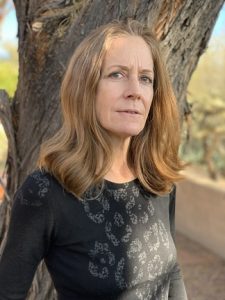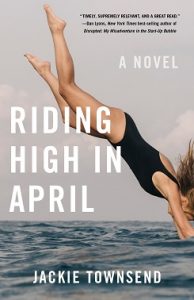Seeing Inside The Unseen
 Many years ago, before I became a writer, I worked for a boutique investment firm in Silicon Valley writing business plans for start-ups. I would sit in plush Palo Alto living rooms with two or three men, always older, always white, who’d already made their fortunes but were looking to make another, bigger one. They wore sneakers and jeans and the finest of cashmere sweaters.
Many years ago, before I became a writer, I worked for a boutique investment firm in Silicon Valley writing business plans for start-ups. I would sit in plush Palo Alto living rooms with two or three men, always older, always white, who’d already made their fortunes but were looking to make another, bigger one. They wore sneakers and jeans and the finest of cashmere sweaters.
They would pace and pontificate and argue about how their idea was going to change the world, while I furiously wrote down everything they said so that I could later spend all night in my hotel room trying to figure out what it was they actually did say, scouring the web for clues, so that I could understand it enough to write the story.
Because that’s what a business plan is, a story. One with a beginning, middle, and a big, fat, huge ending that ideally involves you standing on the balcony of the NASDAQ stock exchange ringing the bell on your company’s opening day. It’s a formula, not unlike the ones in movies and books.
Why was I doing this? A search engine to compete with Yahoo!; an electronic-trading platform; a real estate portal; an AI engine that could predict blockbuster movies—I didn’t care about these things, they felt beyond my capacity to comprehend. This wasn’t climate change or cancer problems we were solving. I was basically helping these masters of the universe feel intellectually stimulated, stroking their egos, giving them something to do with their days. I suppose I was caught up in it all. Everyone in tech was making it big, why couldn’t I?
I have to say it was a relatively easy transition for me into fiction writing. Massaging truths to the benefit, or detriment, of my characters. Using those truths to my advantage, which makes me believe that what I’m writing now is no different than what I wrote then. If my novels aren’t all just smoke and mirrors.
But let’s forget about my insecurities for now, fast-forward twenty years, three published novels, countless essays and short-stories, since I’ve become a full-time writer, one who watches (happily from the sidelines) her husband continue the pursuit of that elusive tech dream. He’s an Italian who grew up all over the world and knows of no other way to live, and consequently, the themes in my writing tend to be displacement, dislocation.
Whether in search of escape, love, meaning, or redemption, my characters tend to cross seas to find it. To lose oneself in another language, culture, and geography, is to open oneself up to not only great possibility but great vulnerability, and it is difficult to walk away from that experience unaltered.
But this new, fourth novel (Riding High in April, Out Aug 24) hit me deep. In it, I take dislocation to a new realm. Starting with the geographical but layering on the physical. This idea of being dislocated from our physical selves, thanks to technology’s evolution to “virtualization,” meaning, that which makes real what is not. Like us, on a screen.
Or Elon Musk, Steve Jobs, and Mark Zuckerberg in the news. Are they real or imagined? Unicorns, evangelists, the press focusing on the few but not the many, oh how tired I am of hearing about robots. After traveling the world with my husband and seeing how hard tech people work. Network engineers, specifically, the guys, and a few gals, out there fighting to keep the nuts and bolts of technology churning, growing, changing, and evolving. Under-the-radar, working from all corners of the world, dedicated day in and day out so that we users can go about our blissful, screen-filled days unfettered. These are the guys I felt compelled to write about. There is no Silicon Valley cover story about these guys.
My novel is, in part, a discourse on work. The privilege of work. Living to work. Working to live. Working to eat. Working to escape. Working so that one day you won’t have to work. Working because striving is the only thing you know how to do. To the far reaches of the earth you will go to find this work.
Then, what happens when you don’t work. When the work goes away? The work you love, in the hands of automation software, cheap foreign labor, millennials, men. The work that has betrayed you. The work you left, and are constantly thinking of going back to.
I think a lot about that partnership I gave up to become a full-time writer. All those missing trains, planes, and conference tables; the all-nighters, dealing with all the politics and #metoo moments, that sense that I was “making a living.” Why did I really give it up? I’ve told my family, my husband, and everyone else, for years, that I had something creative in me wanting to get out. But no, the reason I quit was because I was afraid.
And here I am two decades later, still afraid. And yet still wanting something, my piece of the writer pie, my seat at the table. To work and work hard. Because the work’s the thing. My mother is eight-four and has yet to retire. Work has kept her alive and thriving. There’s something wrong with us, she and I, and people like us. Our culture. This need to strive. To be seen. Heard. Read. If I could start a movement it would be for writers to feel comfortable not being seen. We matter because we are. I recently watched the movie Nomadland, where people do just that, wander around being unseen, and words can’t describe this movie’s impact on me, other than this one: everything.
RIDING HIGH IN APRIL (She Writes Press, August 24)
 Inside the rising tech microcosms of Seoul, Singapore, Japan, and India, far from the mendacity of Silicon Valley, a serial tech entrepreneur pursues a last-ditch attempt to build something great: COMPASS, an open-source network platform that Microsoft has labeled “reckless.” At stake are his reputation, his dwindling bank account, and his fifteen-year relationship with the only woman he’s ever loved—a woman in the midst of reckoning with who she is and what really matters to her in the face of the narcissism and destructiveness of the technology world. She shows up in Seoul in a big, bold move to be with him—only to find that living in Asia reshapes her in intangible, unexpected ways.
Inside the rising tech microcosms of Seoul, Singapore, Japan, and India, far from the mendacity of Silicon Valley, a serial tech entrepreneur pursues a last-ditch attempt to build something great: COMPASS, an open-source network platform that Microsoft has labeled “reckless.” At stake are his reputation, his dwindling bank account, and his fifteen-year relationship with the only woman he’s ever loved—a woman in the midst of reckoning with who she is and what really matters to her in the face of the narcissism and destructiveness of the technology world. She shows up in Seoul in a big, bold move to be with him—only to find that living in Asia reshapes her in intangible, unexpected ways.
Taut and richly layered, Riding High in April
—
JACKIE TOWNSEND
Before becoming a full-time writer, Jackie Townsend received her MBA from UC Berkeley and worked as a financial consultant in the Bay Area alongside her Italian husband, who worked in Silicon Valley and other parts of the world before starting and running his own tech company. That career, both exciting and exhausting, fuels Jackie’s novels and essays, as well as the blogs she posts at jackietownsend.com, as do her travels and exposure to foreign cultures. Meanwhile, her husband continues the pursuit. Jackie’s previous two books, The Absence of Evelyn (Spark Press) and Imperfect Pairings, both won or placed in a variety of Indie Awards. She is a native of Southern California who lived for many years in the Bay Area before she and her husband landed themselves in New York City, where they live today.
Follow her on Twitter https://twitter.com/jtownbooks
Category: On Writing
























